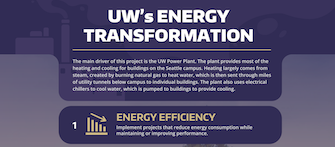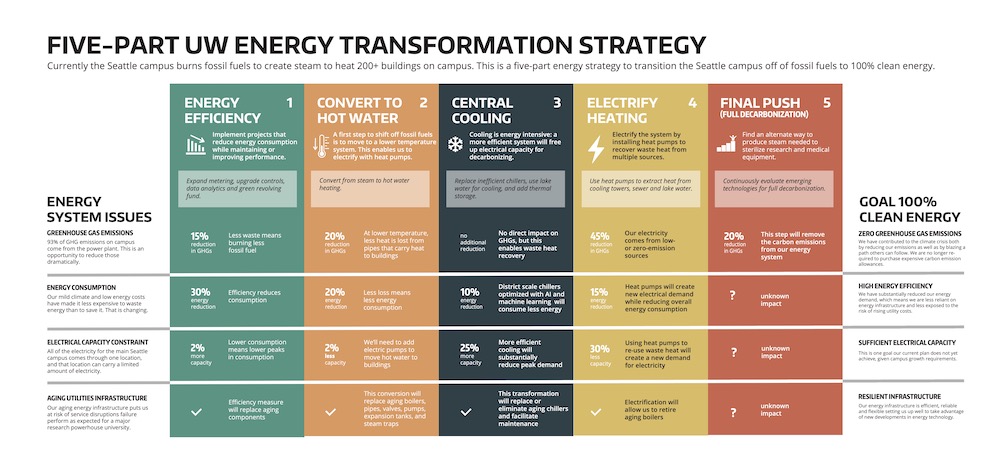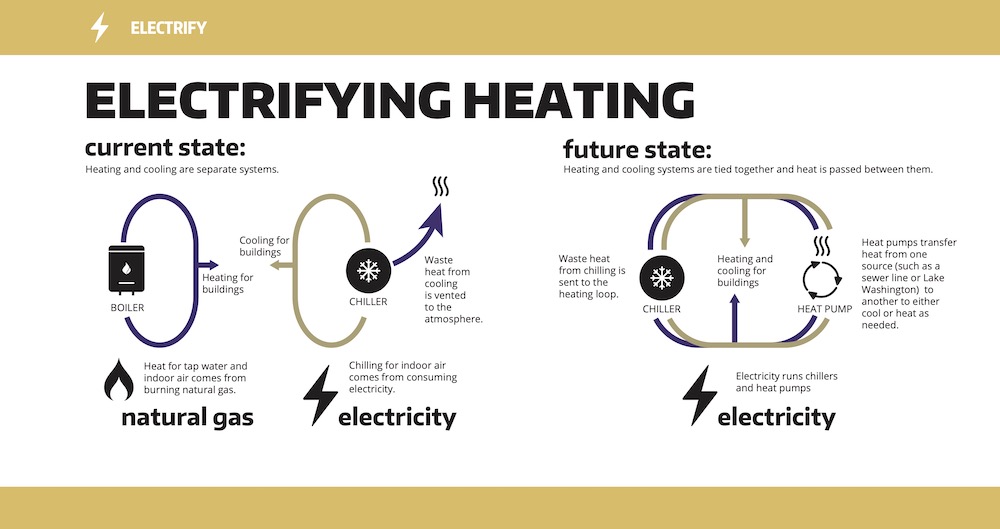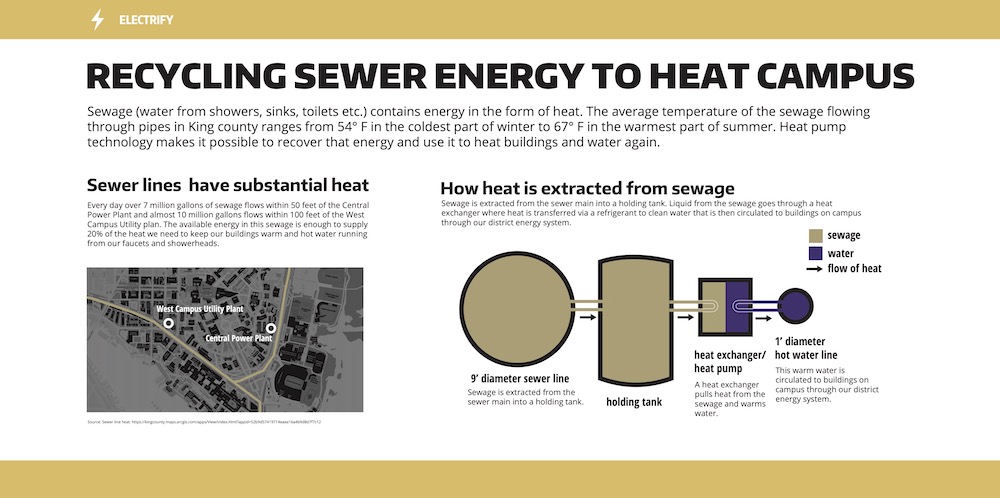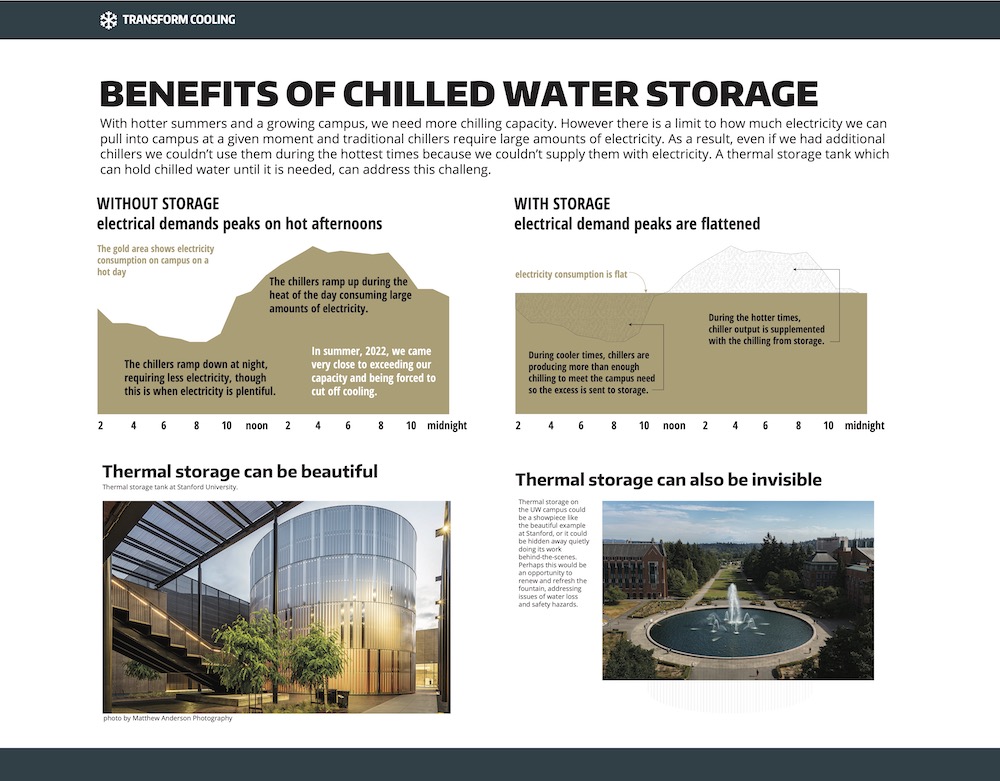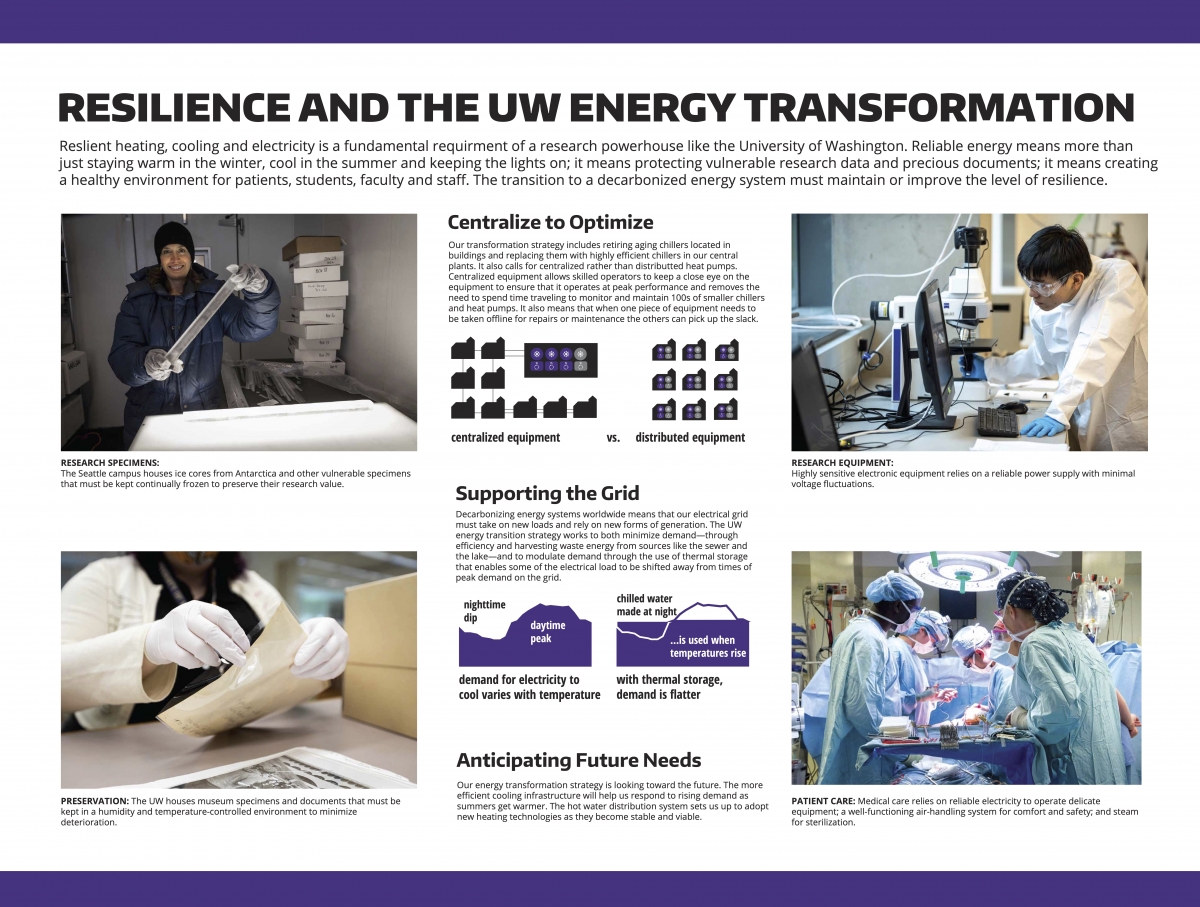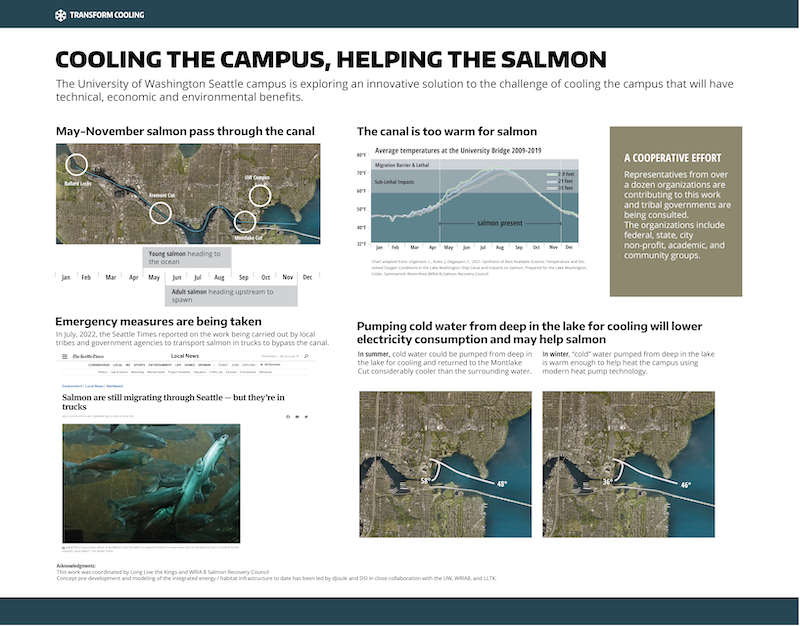Recording: UW Decarbonization Town Hall
This panel discussion touched on existing plans, prospects for envisioning and funding decarbonization efforts, and the potential for the UW to be a leader in climate change response.
The UW is working to fully decarbonize the energy system of the Seattle campus. This monumental undertaking will modernize the UW's energy infrastructure and better align the University's sustainability values with daily campus operations.
The main driver of this project is the UW Power Plant. The plant, across Montlake Boulevard from the IMA, provides most of the heating and cooling for buildings on the Seattle campus. Heating largely comes from steam, created by burning natural gas to heat water, which is then sent through miles of utility tunnels below campus to individual buildings. The plant also uses electrical chillers to cool water, which is pumped to buildings to provide cooling.
Why do we need to act?

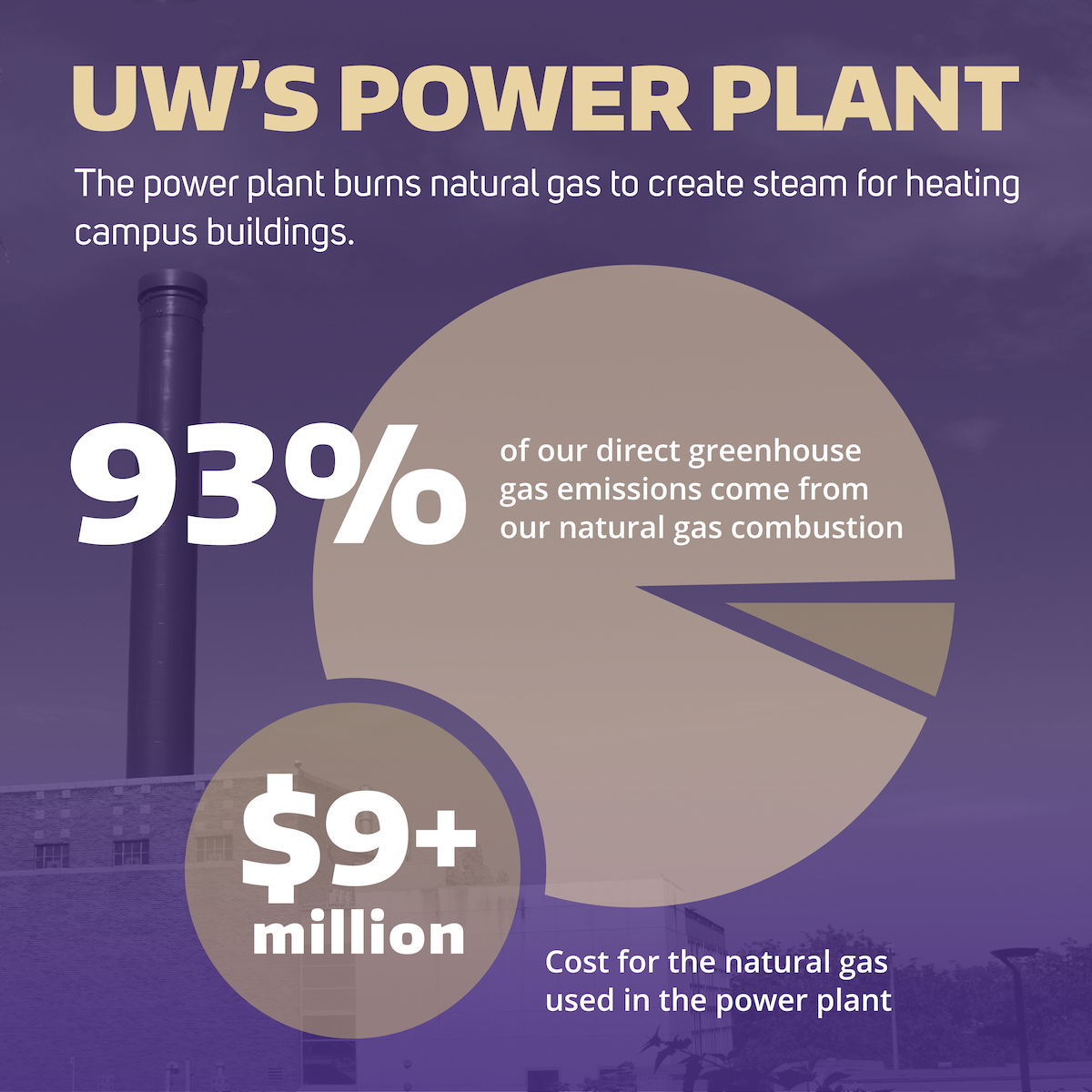 The current energy system has served the Seattle campus well for more than 100 years, but its age and dependence on fossil fuels create risks and no longer align with the mission of the University. Maintaining the existing status quo would be costly and leave the UW as one of the largest greenhouse gas emitters among the state's public institutions. UW’s clean energy transformation strategy will meet the following objectives:
The current energy system has served the Seattle campus well for more than 100 years, but its age and dependence on fossil fuels create risks and no longer align with the mission of the University. Maintaining the existing status quo would be costly and leave the UW as one of the largest greenhouse gas emitters among the state's public institutions. UW’s clean energy transformation strategy will meet the following objectives:
- Maintain a level of service worthy of a world-class research institution
- Model solutions to environmental and financial challenges
- Remain flexible to future technologies
- Serve as a living lab
- Exceed city and state requirements
- Minimize total cost of ownership
The challenges
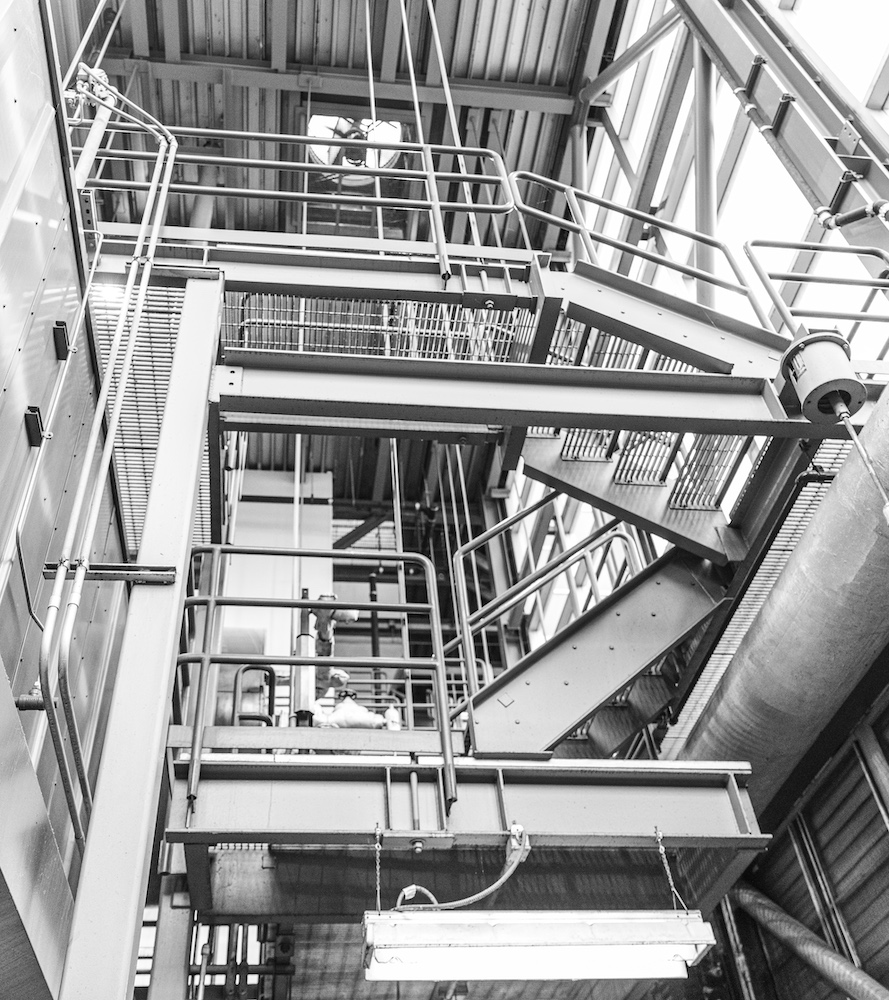 Greenhouse gas (GHG) emissions
Greenhouse gas (GHG) emissions
About 93% of the greenhouse gas (GHGs) emissions on the Seattle campus are generated by the Power Plant. Eliminating these emissions will help the UW meet city and state GHG reduction mandates. If the UW takes no action, the University will pay approximately $4 million in fines and carbon allowances starting in 2023 and increasing to $15 million in 2029.
Energy consumption
The mild climate and historically low energy costs of the Seattle area have limited the financial benefits of many efficiency upgrades. As a result, our energy consumption per square foot of building space is nearly twice as high as targets set in Washington state's Clean Buildings Performance Standard. Rising utility costs combined with mandates for lower energy consumption are tilting the balance, demonstrating a strong business case for many efficiency projects.
Aging infrastructure
Much of the UW’s existing heating and energy equipment is well past its useful life and in need of replacement. Continued reliance on this outdated equipment strains maintenance resources and puts the UW at risk of service disruptions and equipment failures that jeopardize our ability to provide the level of energy service needed by a major research powerhouse university.
Electrical capacity constraint
All of the electricity for the main Seattle campus comes through a single location. The maximum amount of electricity that can flow through that site at a given moment is constrained by the size of the cables and the need to maintain redundancy in case of a catastrophic failure. On hot summer afternoons when cooling demand is high, the Seattle campus approaches that maximum load and runs the risk of shutting off cooling. Additional electrical capacity is needed to add cooling to campus buildings, and meet new winter demand when the UW shifts from fossil fuels to electricity for heating.
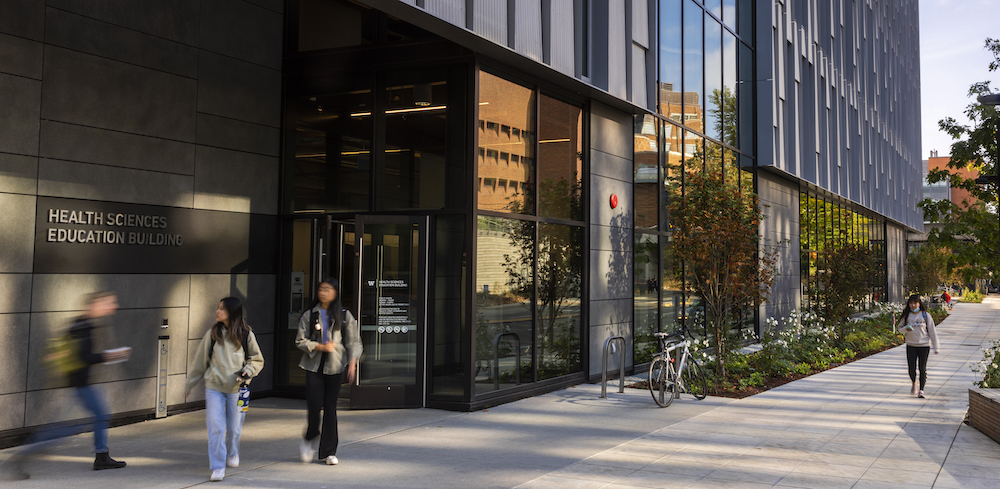
The path forward
In order to transition the Seattle campus utility system to 100% clean energy and decarbonize the heating and cooling system, the UW is looking at a five-part strategy.

1. Energy efficiency
To accelerate the work to make the campus more efficient UW Facilities is installing additional meters, upgrading building control systems and expanding data analytics. This will provide the insights the UW needs to optimize energy use. It will also help comply with state and city building performance mandates.
2. Convert to hot water
A first step to shift off fossil fuels is to transition from a high temperature steam system to a lower temperature hot water system. This leads to part four of the strategy.
3. Central cooling
Cooling is energy intensive: a more efficient system will free up electrical capacity for decarbonizing. The UW will transform cooling by replacing inefficient, aging building chillers with cooling capacity from the central plant and add chilled water storage.
4. Electrify heating
Electrify the system by installing heat pumps to recover waste heat from multiple sources.
5. Final push (full decarbonization)
Fully reducing the UW's dependence on fossil fuels will require an alternate way to produce the steam needed to sterilize research and medical equipment. UW Facilities is monitoring developing technologies to be prepared to implement the best option to solve this challenge.
Proposed renewal projects
As part of the 2024 state legislative agenda, the UW is requesting funding from the Climate Commitment Account during the 2024 legislative session for six projects that support foundational energy renewal and decarbonization efforts. The total requested amount for these projects is $48.9 million, which would support efforts across all three campuses and UW Medical Center facilities. These six projects will help modernize the UW’s energy infrastructure and better align the University's sustainability values with daily campus operations. Five of the six projects were included in the Governor’s 2024 supplemental capital budget proposal. The projects and the requested funding amounts are:
UW Seattle Centralized Chilled Water Capacity Improvements ($14 million): This will fund the installation of piping to help distribute chilled water to the William H. Foege Building, Ocean Sciences and several wings of the Magnuson Health Sciences Center to the central cooled water system, shifting away from the existing decentralized cooling systems in those buildings. Cooling in these buildings is required to support the vivaria, laboratory, and teaching spaces and to mitigate heat gain from research equipment. The project would be more energy efficient, reducing the electricity needed to cool the buildings.
Clean Energy Institute ($10 million): The Clean Energy Institute is expected to move into a new West Campus building in 2025, which will nearly triple the institute's existing space. This funding would fully build out the project space and provide equipment for the Clean Energy Testbeds and other engagement programs. This project was not included in the Governor's budget proposal.
UW Bothell Central Plant Optimization & Gas Boiler Replacements ($6.5 million): This will support energy renewal upgrades at the UW Bothell campus, including upgrading the existing 1,000-ton chiller at the Central Plant and replacing 21 domestic gas heaters with electric heaters in campus facilities. These projects will help reduce greenhouse gas emissions by installing more efficient equipment to bring the campus further into compliance with the State Clean Buildings Performance Standard.
UW Tacoma Gas Boiler Replacements ($8.4 million): UW Tacoma currently uses natural gas as the primary heating source. This project will replace five large gas-fired boilers, 11 unitary gas packs, and associated infrastructure with electric condenser boilers or heat pumps, dramatically reducing the use of fossil fuels for heating on the campus. The existing gas-fired boilers are increasing in maintenance costs due to the age of the legacy equipment, and this project is estimated to reduce operating costs by 50 percent while improving indoor and outdoor air quality.
UW Medical Center Montlake HVAC Systems Renewal ($8 million): Many parts of the existing HVAC systems are long past their expected life and are prone to failure. This project will replace equipment and associated building systems in the Cascade and Pacific Towers, allowing for more efficient and reliable operation.
UW Medical Center Northwest Central Utility Planning ($2 million): This will fund a feasibility and predesign study for developing a Central Utility Plant at the UWMC Northwest campus. The existing decentralized utility structure creates issues in terms of maintenance, reliability, and excess energy consumption. The development of a central plant to support existing and future development is critical to the goal of decarbonization.
More information
Legislators tour the Power Plant | UW State Relations
November 2023
Urgency of climate crisis motivating action across the UW | UW President's Blog
September 2023
Students light climate fire under UW | KUOW
May 2023
For Earth Day, UW eyes a carbon-neutral future | UW News
April 2023
Emitting greenhouse gases in WA? Here’s who will need to pay up to pollute | The Seattle Times
February 2023
How the UW handles extreme heat | UW Facilities blog
October 2022
Facing our energy future | UW Facilities blog
April 2022
Printable information sheet (PDF)
Posters
Get connected
In order to make this project a success, the needs of all members of our campus community will need to be understood, with outreach to a wide variety of students, faculty and staff. Reaching these goals will require a transition period of renovation to many buildings and possible disruption to areas of campus as utility infrastructure is upgraded. UW Sustainability wants to make sure we hear and understand the concerns of campus to minimize negative effects while ensuring a more sustainable future. We also want to know about cutting-edge innovations faculty and researchers are working on that might inform this project.
Students who are interested in learning more and providing feedback can join the Student Energy Task Force meetings. Every other month, David Woodson, the executive director of Campus Energy, Utilities and Operations, hosts a meeting and all current UW students are welcome. Please register here for the Zoom link The student task force meetings for Winter, Spring and Summer quarters 2024 will be:
January 22 (Monday), 4-5 p.m.
April 1 (Monday), 4-5 p.m.
May 23 (Thursday), 4-5 p.m.
July 22 (Monday), 2-5 p.m.
UW Sustainability has put together a list of other engagement opportunities on our blog. Contact sustainability@uw.edu with questions, or contact David Woodson, the executive director of Campus Energy, Utilities and Operations who is leading much of the effort, at dwoodson@uw.edu.
